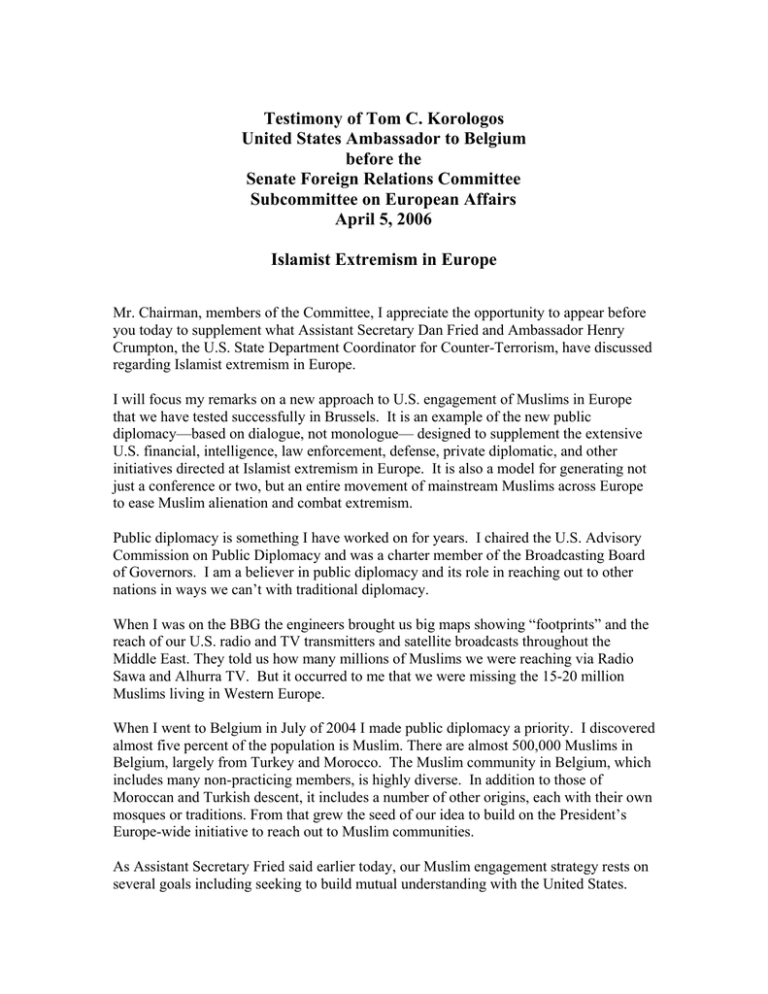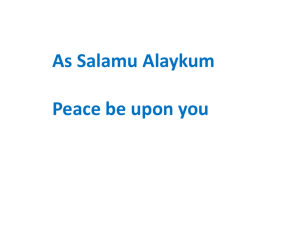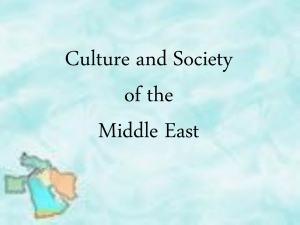Testimony of Tom C. Korologos United States Ambassador to Belgium before the
advertisement

Testimony of Tom C. Korologos United States Ambassador to Belgium before the Senate Foreign Relations Committee Subcommittee on European Affairs April 5, 2006 Islamist Extremism in Europe Mr. Chairman, members of the Committee, I appreciate the opportunity to appear before you today to supplement what Assistant Secretary Dan Fried and Ambassador Henry Crumpton, the U.S. State Department Coordinator for Counter-Terrorism, have discussed regarding Islamist extremism in Europe. I will focus my remarks on a new approach to U.S. engagement of Muslims in Europe that we have tested successfully in Brussels. It is an example of the new public diplomacy—based on dialogue, not monologue— designed to supplement the extensive U.S. financial, intelligence, law enforcement, defense, private diplomatic, and other initiatives directed at Islamist extremism in Europe. It is also a model for generating not just a conference or two, but an entire movement of mainstream Muslims across Europe to ease Muslim alienation and combat extremism. Public diplomacy is something I have worked on for years. I chaired the U.S. Advisory Commission on Public Diplomacy and was a charter member of the Broadcasting Board of Governors. I am a believer in public diplomacy and its role in reaching out to other nations in ways we can’t with traditional diplomacy. When I was on the BBG the engineers brought us big maps showing “footprints” and the reach of our U.S. radio and TV transmitters and satellite broadcasts throughout the Middle East. They told us how many millions of Muslims we were reaching via Radio Sawa and Alhurra TV. But it occurred to me that we were missing the 15-20 million Muslims living in Western Europe. When I went to Belgium in July of 2004 I made public diplomacy a priority. I discovered almost five percent of the population is Muslim. There are almost 500,000 Muslims in Belgium, largely from Turkey and Morocco. The Muslim community in Belgium, which includes many non-practicing members, is highly diverse. In addition to those of Moroccan and Turkish descent, it includes a number of other origins, each with their own mosques or traditions. From that grew the seed of our idea to build on the President’s Europe-wide initiative to reach out to Muslim communities. As Assistant Secretary Fried said earlier today, our Muslim engagement strategy rests on several goals including seeking to build mutual understanding with the United States. 2 We realized that the United States required a way to listen to and speak with this important community. Thus we have developed our main tools of dialogue and our public diplomacy programs, including exchanges, International Visitor Leadership Programs, sending American experts and embassy officials on speaking tours and engaging with the media. The President, Secretary Rice and Undersecretary Hughes have all spoken on the importance of these exchange programs and of their support for them. Belgium provided a particularly propitious environment for such an effort. It has a long history of multiculturalism and multilingualism. In Belgium, religion is valued and supported. Public school students are required to take moral education and can choose from several varieties of Christianity, Judaism, Islam or secular studies, all given by teachers supported by the state. The state also supports religious institutions and has been moving over the past year to fulfill a more than decade long pledge to provide such support to Muslim institutions, channeled through the Muslim executive. In Belgium Muslims vote and win elective office. Due to the fragmented nature of Belgian politics where several parties divide the vote and form shifting coalition governments, Muslims have clout. In the last regional elections for example, Muslims in Brussels won nearly a quarter of the seats, roughly their share of the population. The Muslim vote was responsible for a change in the political leaderships of the “capital of Europe.” They voted mostly for one political grouping, but now, much like in U.S. politics, other parties are making a play for these votes. In addition, Belgium has made a visible effort to bring Muslims into government services including the police. This along with the fact that Muslims are not ghettoized into depressing high rise suburbs, explains the creation of a sense of participation. Our Embassy in Belgium has been doing Muslim outreach for some time including with local and federal elected officials. Following the example of President Bush and Secretary Rice I held our first Iftar dinner shortly after I arrived and I met with leaders of the Muslim community as well as the elected Muslim Executive and with Muslim members of the Belgian Parliament. But I am aware that there were other opportunities available for learning and understanding. There were no channels of communication between American Muslims and European Muslims in Belgium – channels that could provide important tools to both communities through lessons learned about identity, balancing faith and nationality, and integration. When I made this realization and I realized the potential strength of building these relationships, I thought I would try to do something about it. First, we conducted research and found that despite many differences such as socioeconomic status and migration histories, many Belgian and American Muslims share common experiences as minorities in largely Christian and secular Western societies. 3 Indeed many Belgian Muslims are skeptical about America. However, our research showed they are not mostly concerned about us. They are mostly concerned about their daily life in Belgium, and problems such as unemployment, discrimination, education, and bias in the media. That being the case, what could we do to engage them and not leave the Belgian government feeling we were meddling in their internal affairs? We know that in the United States there are approximately 3 to 6 million Muslims. So, for Muslims living in minority status in Europe, it seemed to me that American Muslims are natural interlocutors. Despite their differences, both communities are striving to define themselves and fashion their lives in secular Western society. We thought they’d have a lot to offer each other. We also wagered that American Muslims could perform the public diplomacy heavy-lifting that we in the embassy could not. After all, they have the life stories to tell each other and to connect with fellow Muslims. Thus, after considerable planning, our Embassy in Brussels, together with nongovernmental organizations and private sponsors from the United States and Belgium, brought together an impressive group of 32 American Muslims to meet with an equally impressive group of 65 Belgian Muslims. The purpose was to discuss everyday practical issues regarding Muslim participation in society. Our two-plus day dialogue, titled “Muslim Communities Participating in Society: A Belgian-U.S. Dialogue” occurred in Brussels last November. It was a first-ever people-to-people exchange between American and Belgian Muslims, focusing on Muslim identity, civic life, economic opportunity, media portrayal, youth development and women’s issues. It was NOT another academic or typical think tank exercise with experts lecturing from a podium about Muslims and at Muslims. This was Muslims talking with other Muslims. This was dialogue. Not monologue. They shared their differences, their experiences and their frustrations but also their good practices and success strategies. We engaged the moderates in the hope there would be a coincidence of interest. Was this risky? Was it ambitious? Yes. But I am happy to report it also was a success. If I may, Mr. Chairman, at this time I would like to present to the Committee a sevenminute film of excerpts from the conference, including our standup Muslim lawyercomedian, which should give you a feel of what I was trying to accomplish. <<<Seven Minute DVD>>> We struck a chord with our Muslim audiences. These are communities that feel under siege post 9/11. The dialogue gave them an opportunity to be seen, to be heard and to be acknowledged and most importantly to be respected. They felt affirmed and they showed their appreciation. They took away encouragement, hope, practical suggestions, new 4 relationships and specific projects to work on going forward. They told us that this was the first time they actually felt as if the American government respected their opinion enough to ask them to share their experiences with others. They see the importance and credibility of their role. The dialogue produced immediate results. The mayor of Dearborn, Michigan, Michael Guido, and the mayor of Genk, Belgium, Jef Gabriels, attended and spoke of how large Muslim and ethnic communities in their respective cities succeeded in participating in society. They discussed “Here’s how it works for us.” They agreed to begin a sister city relationship. The Islamic Society of North America, the largest Muslim organization in the United States, announced a package of internships, scholarships and exchanges for Belgian imams and Muslim leaders, teachers and students to come to the United States to engage further with the U.S. Muslim community. KARAMAH, a U.S.-based Muslim women’s legal group, invited Belgian Muslim women to the United States for training seminars. Muslims in the American Public Square, a cooperative research study group, and Intermedia, another research group, will join a Belgian partner to produce a study that will provide a template better to understand Muslim communities in the West. The Annenberg School for Communication at the University of Southern California and a Belgian partner are working on a program to engage Belgian and American reporters, editors, anchors and producers on the challenges and good practices related to covering Muslims and Islam in the media. Given the recent controversy about the Danish cartoons, this effort should be very timely indeed. There were many discussions among the participants on ideas for follow-on sessions and how the dialogue might be replicated in other European countries. For instance many Ambassadors have asked for details on how we did it so they can replicate the model. We have dubbed it “the dialogue that keeps on giving.” At the end of the day, however, we have to answer how all of this benefits the United States. First, we gained the participation of the American and Belgian Muslim communities in a U.S. public diplomacy initiative despite skepticism many of them have about the United States. With a well-designed program created by professional facilitators, we framed and conducted the dialogue around domestic issues of importance to minorities. We created conditions for genuine dialogue of moderate Muslims to explore issues of mutual interest, share good practices and strategies for participating in society and identify ideas for future cooperation. We helped the Moroccan and Turkish Muslim communities in 5 Belgium see how new forms of practical constructive action could address their real needs and hopes. We have been able to call on conference alumni. When the Mohammed cartoons were published, we invited a group of them to meet with Assistant Secretary Fried and Farah Pandith from the National Security Council. Assistant Secretary Fried urged them to turn to other moderate and responsible Muslims throughout Europe to help diffuse the volatile cartoon issue. Second, we reached out to Muslims in a subtle manner, on their terms for which they are thankful, and consequently they saw the U.S. government in a more positive light. They felt respect and that is essential to any relationship. American Muslims have craved an opportunity to serve their nation and in this venue they did. Third, we attempted to empower Muslims and counter the alienation that can spur radicalism and even terrorism. We encouraged them to define themselves and Islam as peaceful and moderate. Both directly serve American interests in the War on Terror. Fourth, by facilitating contacts with U.S. Muslim leaders for their community organizations, we helped enfranchise Muslims within the larger society so as to promote the long-term stability of Western, pluralistic democracy. As Assistant Secretary Fried pointed out in his testimony, Muslim integration is arguably one of the top challenges facing Western Europe today. Moving Muslims from the margins to the mainstream of society is essential. American Muslims have through their unique stories and experiences found ways to be proud and practicing Muslims and proud Americans who value freedom, liberty and democracy. Their challenges to integrate and develop their own American identity are powerful lessons. Fifth, we displayed no U.S. superiority. We professed no easy answers and sought to learn from the participants. We said our two societies shared the common challenge and goal of Muslim integration. Indeed our U.S. participants were impressed by the level of political clout of Belgian Muslims. We reached out to our Belgian friends to work with us. And ultimately, they did. Mr. Chairman, if I may, let me explain for the record how our conference developed. I must say initially we faced resistance and concern from many quarters, both in the United States and Belgium. There was fear the session was going to become an embarrassment for the United States and for Belgium. The major concerns were that it was going to turn into an anti-American attack on our Middle East policies and our Iraq policy, and become an anti-Israeli session. From the Belgian side the concern was that the United States was meddling in local Belgian affairs, stirring up Belgian Muslims against the government. After all, there is a large unemployment issue among Belgian Muslims. 6 We assured our sponsors and Belgian government officials beforehand that the format of the conference and the caliber of those selected diminished the risk for confrontational problems. Having said that, let me say we did not in any way try to muzzle or curtail any of the dialogue or discussion. The participants decided that the purpose of the conference was to discuss better ways of making things work and of exchanging ideas and thoughts. Our next challenge was to agree on a list of participants. We vetted, checked and rechecked those we invited. Some of the organizations whose members participated in the Conference have been accused of being extremist. It is possible that some individual members of those organizations have made statements that have been termed extremist. Our view however, was to base our selection on the stated policies and specific actions of organizations and individuals today with regard to harmonious Muslim integration into American and European society. We wanted them to hear and participate in our dialogue with fellow moderates. Did we succeed? I believe that every participant in the Conference went home with a better understanding for the Muslims on the other side of the Atlantic. A word about the schedule. On Tuesday, November 15, 2005 we held a welcome dinner for the American participants at the Embassy residence. The next morning the conference began at a local hotel, where I gave opening remarks at a plenary session followed by remarks from Ambassador Claude Misson the Director General of the Royal Institute for International Relations. I admonished all participants that I did not want to see Americans talking with Americans and Belgians talking with Belgians. I insisted that each conversation group at the various receptions and lunches have at least one participant from the other country. Then we broke up into small group dialogue sessions, each with a facilitator and translator. Topics included identity, women’s issues, education, employment, media portrayal and similar issues. That evening we held a reception and dinner, which included entertainment by American and Belgian performers. The next day we held more small group dialogue sessions and heard from Mayor Guido and Mayor Gabriels. A plenary session discussed the results of the dialogue sessions, conference conclusions, and what follow-on activities might happen We limited attendance to conference participants only, since we did not want the participants to feel inhibited by the presence of media or outside observers. On the second day, however, we held a briefing and press conference for all participants and 7 included several distinguished observers from both the United States and Belgium. I might add we even had an observer from the General Accountability Office. Finally, on the third day, we hosted an Interfaith luncheon at the Embassy with conference participants, 20 Belgian religious leaders, Embassy staff and Belgian government officials. Mr. Chairman, the applause you saw at the end of the DVD wasn’t for me—although it sure felt good. It was an emphatic response to the recognition of common bonds across the Atlantic. When was the last time 100 Muslims gave a U.S. government official a standing ovation? It worked, Mr. Chairman. We needed to find a way for Muslims in Europe to move beyond the media image and directly perceive the reality of life in America. We found one. We have discovered a new form of U.S.-sponsored Muslim engagement and empowerment—based on dialogue, not monologue among Muslims themselves. Just as our Brussels vision was not to host a conference but to start an ongoing dialogue and program of action, I suggest the Department seize the opportunity and expand similar exchanges to catalyze and cultivate more relationships, networks and initiatives with the Muslim communities around the world. Thank you, Mr. Chairman and members of the committee. I am happy to take your questions and comments.





